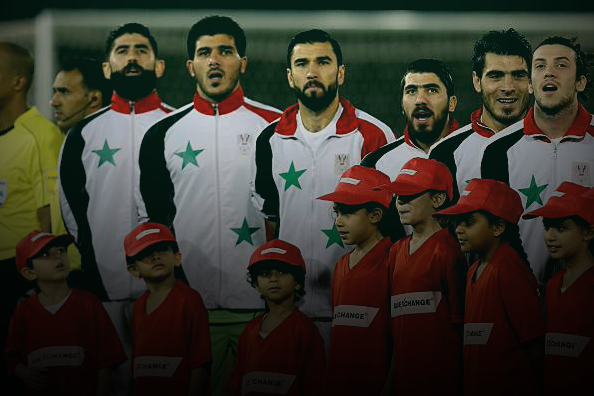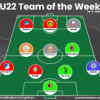Oliver McManus writes about Syria’s unlikely quest for World Cup qualification, providing insight into the political and football backdrop of the campaign.
Amid the backdrop of one of the most horrendous wars of all time, there is emerging a new narrative, something to bring some small relief to the people of Syria.
I’ve said it before and I’ll say it again, football has an incredible power to unite people when they are otherwise divided and the story of the Syrian men’s national football team is one to behold – it’s not going to end the war, it’s not even going to fully distract people from it but, once every now and then, it gives the country 90 minutes just to enjoy themselves again.
Few would have suspected that, when the uprising began in 2011, Syria would continue to be ravaged by warfare to this very day. It’s a weird world you live in when mortar and shells can be landing 300 yards away from a stadium and children across Syria just continue to play the game they love so much. This is their life though, they’re not going to be cowed by the terror.
 Having been disqualified from their previous World Cup qualification campaign after just 2 games, the national team have struggled for a long time, in reality; let’s have a quick look at their background before turning to their, hopefully, more prosperous future.
Having been disqualified from their previous World Cup qualification campaign after just 2 games, the national team have struggled for a long time, in reality; let’s have a quick look at their background before turning to their, hopefully, more prosperous future.
In a weird way, I’ll start with a bit of political information on Syria and, really, the cause of all the chaos in the region; Bashar al-Assad, the 19th and current President of Syria, came to office at the turn of the century.
Initially he was seen as a potential political reformist for his country but, after a crackdown on protesters which, ultimately, led to the Syrian Civil War, the European Union, United States of America and, much of, the League of Arab States called for his resignation. That was in 2011 and, yet, 6 years later, Assad is still steadfast in his power – in 2014, he was placed on a list of War Crime suspects by the International Criminal Court.
That’s the politics, let’s deal with the football side of it all then;
The Syrian Arab Republic national football team, to give them their official name, are known more colloquially as The Qasioun Eagles or Les Aigles du Qaisoun and have been participants of the beautiful game for, nearly, 70 years.
They’ve yo-yoed up and down the rankings but have their peaks have never been particularly high – 78th was their best ranking, that came 24 years ago and, far more recently, they’ve been as low as 152nd.
And, before this campaign, they hadn’t fared too well in World Cup Qualification; 22 loses in 64 games was indicative of a country without grassroots development and, rather predictably, they’ve never appeared at a World Cup finals.
In Asia, though, perhaps they’ve been faring better? Eh, I mean, kind of. The Asian Football Confederation’s premier event, the AFC Asian Cup, was a showcase for up and coming talent across Asia and, Syria had done alright in these tournaments.
The country has qualified 5 times for the finals although, unfortunately, have never made it past their First Round; I’m feeling what you’re saying, I really am, but they’ve won 31 of their 59 qualification games so you kind of end up scratching your head for two reasons; (a), how haven’t they qualified for more than 5 competitions? (b) How hasn’t that transferred to better success. Nonetheless, I’m giving them credit for solid qualification play.
Like I say though, recently, they’ve been in turmoil; as a result, primarily, of the conflict that Assad has poured onto their nation and, as a result, you could be forgiven for expecting them to shut-up shop whilst their country was being torn apart.
But they didn’t, in a strange way, it motivated them to bigger and better things. I’m not saying that the war is the reason why they’re doing better – it’s not and it would be ridiculous to even say that – but, undoubtedly, their performances seek to be a beacon of hope which the people of Syria can carry with them.
As previously mentioned, after the team had ebbed to a record low of 152nd in the World Rankings – in both September 2014 and March 2015 – the governing body turned to Fajr Ibrahim in a bid to revive their fortunes.
Ibrahim, a 52-year-old, was born in the capital of Damascus and had taken charge of the national team on 2 previous occasions – both with significant success; his first stint spanned 2 years and 24 games, of which the country won 13 and finished 2nd in the 2007 Nehru Cup. His returned to the helm just 8 months after he left (in March 2008), and he brought them more success as they lost just 2 games in 16 and, yet again, were runners-up at the Nehru Cup – this time for the 2009 edition.
He took charge for the 3rd time on the 6th January 2015, after the country had gone through 11 managers since the September 2010. Now, under normal circumstances, I’d probably make some sort of quip about how they weren’t very stable with their managers but, then again, Syria hasn’t known normal for a very long time.

Syria’s head coach Fajr Ibrahim (L) greets Singapore football team’s German head coach Bernd Stange (R) ahead of their 2018 FIFA Group E World Cup qualifier (Photo credit: ROSLAN RAHMAN/AFP/Getty Images)
The national team has never qualified for a World Cup, they’ve never even progressed from the group stages of qualification so expectations weren’t particularly high when they set off on the journey to Russia 2018.
You’ll recall that earlier I mentioned about training taking place in the fore of shelling – they’re not allowed to play any matches in their home country.
Through a mix of economic sanctions and security fears, the Syrian national team are forced to play their designated “home” games at an array of neutral venues in front of just a handful of fans.
The country was drawn in a Second Round group with Japan, Singapore, Afghanistan and Cambodia – at the time, they were ranked 126th in the world and no-one was expecting miracles.
Miracles are what they got though – as I mention, not many fans were able to attend the games but they were beamed on television sets, the nation over. Now, obviously, not everyone in Syria has access to a TV and there aren’t exactly a load of pubs that they can go to. As a result, whole towns and cities would often congregate in one spot to cheer on the men in white as they pursued the dreams and freedoms of 22 million people.
They got off to a rocking start, as well. 26 goals in their 8 games demonstrated their free-flowing football which, very often, seemed care-free but, at the end of the day, got the job done.
6 wins in the group, including 2 6-0’s and a 5-2, made sure Ibrahim’s men finished in 2nd place and progressed to the 3rd round of qualification.
In the 3rd round, Syria would be part of 12 teams vying for just 4 guaranteed spots in the 2018 World Cup. Here’s the catch though, despite their heroics in the 2nd round, Syria were still ranked 110th and, as such, were statistically the 2nd worst nation left in the tournament.
Drawn in a group with the big guns of Iran, South Korea, Uzbekistan, China and Qatar – 3 of which have already been to a World Cup and another who is hosting the tournament in 2022 – it looked as though the adventure may be over for Syria.
But, that would have been okay. They’d already made history and, do you know what, football at the end of the day is just a game. The people of Syria know that more than most but what it also is, is a brilliant device to harmonize communities and through the campaign, even just to that point, the people of Syria had some harmony to their life.
No-one told the national team that their job was done though, not at all.
So what did the team need to revitalize their fortunes – a new manager of course!
The new man in charge was Ayman Hakeem, who had previously taken charge of the team in 2010, on an interim manager, when he won 2 of his 5 games in charge. Not a lot is known about Hakeem but he took charge of the country from June of 2016 with the team in need of a shakeup and that’s what he delivered.

Syria’s head coach Ayman Hakeem looks on during the 2018 World Cup qualifying football match between Qatar and Syria at the Jassim Bin Hamad Stadium in Doha on October 11, 2016. (Photo credit: KARIM JAAFAR/AFP/Getty Images)
New players were brought in, with a focus of mixing youth and experience in an effort to continually develop the squad through the tactical nous of those more veteran players. The 1st of September, 2016 marked their first game of 10 which, if all went well, could see them competing at a World Cup.
Tashkent, the capital of Uzbekistan was the setting, as 29,100 fans (almost exclusively Uzbeks) watched on in a game of nip and tuck; Syria had their chances but nothing that they should have, for certain, put away. The Uzbek fans were audibly irritated with their team’s failure to nullify Syria but, then, in the 73rd minute, came the sole goal of the game – it was Alexander Geynrikh who scored to secure the 1-0 win for Uzbekistan.
The result might not have gone their way, but the Syrian spirits were high and they carried this with them into their next game – a 0-0 draw against the giants of Asian football, South Korea. This momentum continued on to, what would become, the national team’s biggest game of their history.
It’s now October and they’re playing China, in Beijing, now China did reach the World Cup in 2006 but they’ve been on a downward spiral ever since – a wounded lion, then? Let’s not forget, China is home to 1.4 billion people which is 70x the population of Uzbekistan.
Nonetheless, The Qasioun Eagles were fearless and attacked from the outset; they made their key breakthrough in the 53rd minute, as Mahmoud Al-Mawas slotted home to score his 6th international goal and to get Syria their first win in this, the 3rd Round of World Cup Qualification.
Rightly so, the players were richly rewarded – a bonus of £800 each represented an average yearly wage for each of the players and vastly more than many citizens in Syria could ever imagine. They celebrated by going shopping, they definitely deserved it.
The nation actually play their “home games” in Malaysia – in front of little more than 400 fans – but they very nearly were unable to play their games at all.
It’s an unfortunate truth that Syria lacks many friends on a diplomatic basis in the world stage and, given that, not many came forward to offer their infrastructure. In fact, the national team were just one day away from having to forfeit their whole campaign – that’s when Malaysia stepped in.
In six years of war, 4.9 million people have fled Syria, millions more have been killed and yet, the story rising above it all is that of these 23 men putting it all on the line, in the hope that just maybe, just maybe, happiness will find its way to Syria again.
Domestically, football is in disarray; that’s to be expected in a country pre-occupied with war and many of their current squad no longer play football in the country but still, 7 of the 23 players are part of the Syrian Premier League which continues to take place amidst everything that’s going on.
The talent, unquestionably, has been pooled elsewhere – for a safety measure as much as anything – but the league continues. Matches last season were played only in Damascus and Latakia, everywhere deemed too dangerous in the face of the triple threat of the Syrian government, the rebel forces and Islamic State.
There is, however, an issue; not all players have the option of playing abroad. Because, abroad is the preferred option from those in charge – they are urging players to move abroad nowadays. The issue is that conscription still exists in Syria, take Osama Omari; Omari plays for Al-Wahda, based in Damascus, and is only able to play because he is on release from the Ministry of Defence.
Many of the players escaped being drafted by the Army, by virtue of being an only child and, failing that, they just left before they had the chance to be called up.
The Syrian pound has plummeted by 1000% in value since the beginning of the war, meaning there is genuinely no money in the Syrian FA coffers. That’s not hyperbole either, there is just no money. Fans are scared to go to the games, owing to security fears around gathering in large crowds and there are no foreign players in the league; not much of a surprise really.
Despite all this, the national team goes from strength to strength, so let’s return to them and pick up the story in the 4th game of their qualifying efforts; 3 games in, the team had secured 4 points and were starting to build some momentum up when they travelled to Doha to tackle the, equally, exciting and developing Qatar national team.
A fortunate penalty in the 37th minute ensured Qatar survived with 3 points but Syria played well and they weren’t going to be downbeat after a really gutsy performance – especially given the relative controversy surrounding Qatar and their constant picking of players who originate from, say, Brazil and yet, through some loophole, are eligible for Qatar – it’s not banned but it is, somewhat, unethical.
Despite the upbeat, the few and far between nature of the games always resulted in a sort of stop-start in terms of performances and they needed something just to revitalize them.
So, they played a friendly against Singapore and comfortably won 2-0. It doesn’t sound like a lot but it was a chance to get some energy back into the legs of the players; this was swiftly followed by an 0-0 draw against Iraq for their 5th game of qualification.
You can feel all this progress coming to a halt, consistently good performances but not the results to show. A tactical shakeup ensued with some notable players brought back into the fold.
One such player was Firas Al-Khatib, a 33 year-old veteran of the team who had retired in 2012 due to “political reasons”; currently playing for Kuwait SC, Al-Khatib is a prolific goalscorer with 57 goals in his last 71 club games and 93 in all appearances for his national team (including youth teams).
From this alone, you get an idea of the scale of what these players are achieving – so vast that players are willing to turn out for them despite fear of repercussion.
Whereas previously, a gap of 5 months would have been enough to dampen their momentum, this was no such problem going into March of this year, as they took on Uzbekistan in a make-or-break match.
Played at their, by now, home comforts of Malaysia, 350 fans sat sparsely into the stadium with whetted appetites for this 50-50 matchup; Uzbekistan themselves are a team on the up, with rich pickings from their ever-improving Under 23 side coming through the senior ranks. Like Syria, they also needed to win this match and, like Syria, they were equally looking to compete in their first EVER World Cup proper.
Mohammed Abdulla Hassan Mohamed, from the United Arab Emirates, blew his whistle to get the game underway and the 11 men of Ibrahim Alma, Ahmad Al Saleh, Moayad Al Ajan, Omro Al Midani, Amro Jeniat, Omar Kharbin, Mahmoud Al Mawas, Fahad Youssef, Tamer Haj Mohamad, Mardek Mardkian and Khaled Mobayed took the pitch in a bid to make history.
With the sun beaming down on the pitch, temperatures hit 30 degrees Celsius, and 90 minutes of tactical, stalemate football was played out with neither team looking like winning.
The 90 is up and the assistant signals for 4 minutes of added time, but Syria weren’t happy to settle for just the one point; 90+1 and they get a penalty.
Omar Kharbin steps up, the pressure is on, he approaches the ball with a steely look on his face before calmly chipping the ball into the back of the next, panenka-style. Talk about audacity.
The country lied in 4th place, just 1 point behind Uzbekistan and locked in a fierce battle for qualification – 1st and 2nd would equal automatic qualification, 3rd would mean the shot at a play-off.
Omar al Midani, centre back for the country said before the match “The minimum we can do is to give them joy for few hours, we ask God to help us to do that.” Joy most certainly reverberated around Syria for, not just hours but, a good couple of days after this victory.
Their latest match on the 28th of March – an away game to South Korea, who were lying 2nd in the group. As we’ve covered, the reverse fixture resulted in a 0-0 draw and there was reason for Syria to be confident – in their 6 previous games, the team had conceded just 2 goals.
Having said that, they haven’t exactly scored that many either – just 2, as well – and their game plan really revolves around not being able to be broken down and then, hopefully, hitting their opponents on the counter attack. I mean, it might not be the most attractive style of play but, thus far, it’s helped them grind out results in a way few would expect.
They didn’t start too strongly against the Koreans, an early 4th minute goal putting them behind and, despite playing out their skins for the other 86 minutes, Syria couldn’t get back on terms.
So, now, with 3 games to go, Syria are still 4th but, now, are 4 points behind Uzbekistan and the play-off chance. When you look at the remaining games, however (Qatar, China and Iran), you’d expect them to get 2 wins, possibly a draw against Iran and the opposite is to be said for Uzbekistan – you can picture them getting 2 defeats and a win.
I don’t want to tempt fate but if this was to happen, it’s a big if, Syria and Uzbekistan would be level on points and you’d go to goal difference where, FINALLY, the miserly defence of the Eagles could finally play into their favour.
Having come this far, you must be thinking that this is distinctly a feel good story, then? Well, it’s hard to say because of the so, intensely, politicised nature of it all.
From a footballing perspective, it has everything but from a social viewpoint? Well, that is a distinctly double-edged sword.
Their success serves as a brief, momentary, vision of a better future for the people of Syria. But the success also plays into the hands of their president, Bashar Assad. Because, of course, if the country is having a thriving football team then, surely, it shows a united, stable, normal country? That’s what Assad is saying, anyway.
I think the most poignant reminder of life in Syria is that, in the Damascus stadium, the pitch is overlooked by a large mural of Bashar Assad. Serving as a distinct reminder that, you can run as far as you wish but you’ll never truly be free of his iron-clad grip.
Even then, if they do reach Russia, that might not be the end of the story; it’s well documented that Vladimir Putin is a staunch supporter of Assad so, not that it would be legal, would the national team even be allowed to compete in the World Cup? It’s often said that sport is above politics but, when it’s Putin and Assad, you have your serious doubts – anything could happen.
But, for now, can we all just appreciate the efforts of these brave footballers who, in the most devastating of times, are still able to go out and give their all for their country. Who wear the badge of a regime which, many of them, are opposed to but are doing so to give hope to those who have no voice.
For me, that’s what we need to take from this story – in times of darkness there will always be a light at the end of the tunnel; I’m sure I’m not alone in hoping that the Syrian national team can provide some light for the 23 million back home.
- Syria: The path to World Cup qualification - July 8, 2020
- The story of South Africa’s topsy-turvy footballing journey - November 8, 2017
- Interview: Sunil Chhetri on his foreign stints, Bengaluru FC, and the rise of Indian football - October 24, 2017
























































